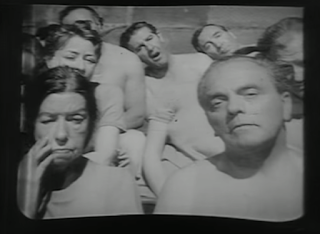** minor spoilers only **
Legion gets a nod in Cyborgs, Santa Claus and Satan by Fraser A. Sherman, so I braved a stuttery stream. A modest Sci-Fi Channel production (not yet "Syfy" in 1998), the tale of future war is like a facetious episode of the contemporary Outer Limits. It doesn't quite work, but with points of interest.
 |
| Terry Farrell in more familiar guise |
The team starts 10-strong, and as they split up for patrol, the viewer may conflate. Most turn out to have been falsely accused and/or acting in self-defense, suggesting the script/movie might've started as a pilot.
These heart-of-gold badasses don't know just what they're fighting, except that it's big and bad and leaves piles of uniformed corpses behind. Once revealed, the foe makes an impression (less so, for those who've glimpsed the box art), but Legion takes too long getting there. Worse, there's little progressive learning, though the viewer may triangulate from the premise, title, and Troy Donahue's character.
In a mystery-thriller, half the fun is matching wits with the protagonists as they strategize. Without intell, Farrell in particular is left hanging, as Doyle incongruously agonizes over her fitness to command. The all-at-once ending seemed confusing -- or maybe I checked out.
These flaws could have been fixed, rather easily; it may've been (self-) sabotage. While the film superficially resembles Space: Above and Beyond, the relatively gung ho Fox series, these Legion-aires are entirely victims of their own command. This cheeseburger of a TV-movie dares portray an American military on imperial business (pointedly, the flag is unseen until a likely suicide errand). Even when tongue-in-cheek, subversive content draws flak.



